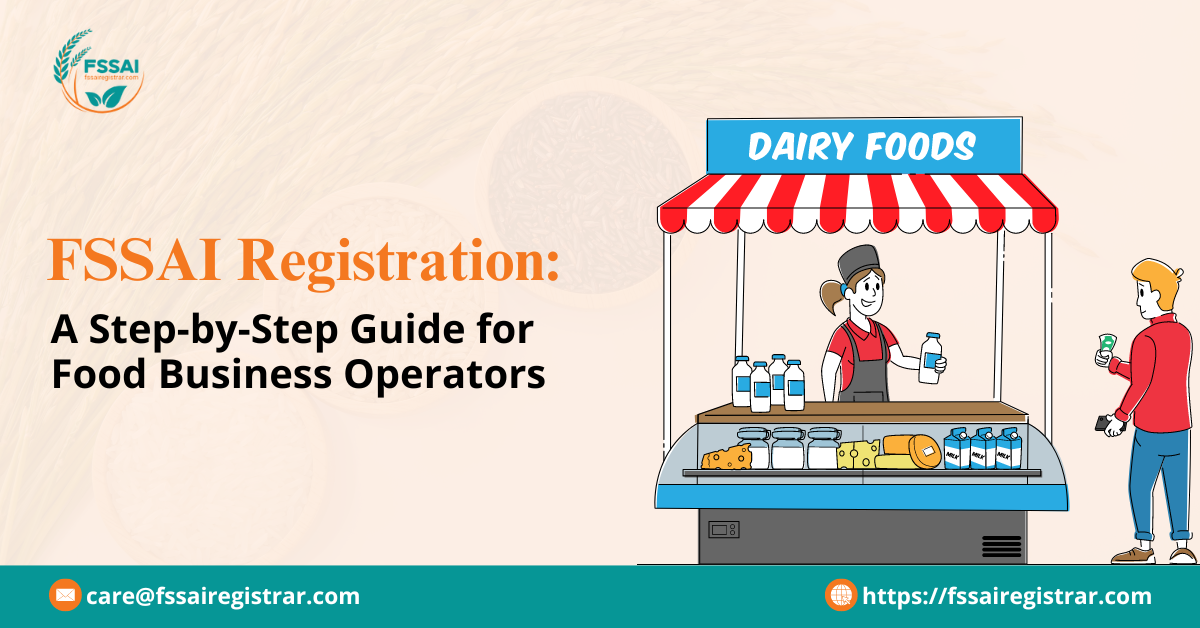Business
FSSAI Registration: A Step-by-Step Guide for Food Business Operators

FSSAI stands for the Food Safety and Standards Authority of India. FSSAI Registration is the process by which food businesses in India obtain a license from the FSSAI to operate legally. It ensures that food products undergo necessary quality checks and meet the standards set by the authority to ensure food safety for consumers. This registration process involves various steps such as submission of documents, inspection of the premises, and payment of fees. It is mandatory for all food businesses in India, including manufacturers, processors, distributors, retailers, and exporters, to obtain FSSAI registration or license depending on the size and nature of their business operations.
The food industry in India is governed by strict regulations to ensure the safety and quality of food products. FSSAI Registration is a crucial requirement for food business operators, serving as a mark of credibility and compliance with food safety standards. However, the registration process can seem complex and overwhelming for many entrepreneurs. In this guide, we break down the steps involved in obtaining FSSAI registration, providing clarity and guidance to streamline the process for food business operators.
Step-by-Step Process for Fssai Registration:
Step 1: Understanding FSSAI Registration
Before diving into the registration process, it’s essential to grasp the significance of FSSAI registration for your food business. FSSAI is responsible for regulating and supervising the manufacture, storage, distribution, sale, and import of food products to ensure their safety and quality. By obtaining FSSAI registration, food business operators demonstrate their commitment to adhering to food safety standards, building consumer trust, and avoiding legal repercussions.
Step 2: Determine the Type of Registration Required
FSSAI offers different types of registrations based on the scale and nature of the food business. These include basic registration, state registration, and central registration. Understanding the category that applies to your business is crucial before initiating the registration process.
Step 3: Gather Required Documents
To initiate the registration process, you’ll need to gather specific documents, including identity proof, address proof, a declaration form, and a food safety management plan, among others. Ensuring that you have all the necessary paperwork ready will streamline the registration process and prevent delays.
Step 4: Complete the Online Application
FSSAI registration can be done online through the Food Licensing and Registration System (FLRS) portal on our official website, fill out the registration form accurately, and upload the required documents. Double-check all information to avoid errors and ensure a smooth application process.
Step 5: Pay the Registration Fees
Once the application is submitted, you’ll need to pay the prescribed registration fees. The fee structure varies depending on the type of registration and the scale of the food business. Make the payment online through the FLRS portal using the available payment options.
Step 6: Await Verification and Approval
After submitting the application and fees, FSSAI will verify the provided information and documents. This verification process may involve inspections or inquiries to ensure compliance with food safety standards. Once the application is approved, you’ll receive your FSSAI registration certificate, valid for the specified period.
Step 7: Display Your FSSAI License
Once you receive your FSSAI registration certificate, it’s crucial to prominently display it on your food business premises. This not only fulfills regulatory requirements but also instills confidence in consumers regarding the safety and quality of your products. Displaying the FSSAI license demonstrates your commitment to compliance and transparency, fostering trust among customers and stakeholders.
Step 8: Maintain Compliance
FSSAI registration is not a one-time process; it requires ongoing compliance with food safety standards and regulations. Regularly review and update your food safety management plan, implement hygienic practices, and ensure the quality of raw materials and ingredients used in food preparation. Compliance with FSSAI regulations protects public health and safeguards your food business’s reputation and sustainability.
Step 9: Seek Professional Assistance if Needed
Navigating the intricacies of FSSAI registration and compliance may be challenging, especially for new food business operators. If you encounter difficulties or have questions regarding the registration process, consider seeking assistance from professionals experienced in food safety and regulatory compliance. Consulting with food safety experts or legal advisors can provide valuable guidance and ensure your business meets all regulatory requirements.
Note: Apply for fssai license renewal through fssai portal.
Step 10: Stay Informed About Updates and Changes
The landscape of food safety regulations is dynamic, with updates and changes introduced periodically by FSSAI to address emerging challenges and enhance consumer protection. As a food business operator, it’s essential to stay informed about these updates and implement any changes relevant to your business promptly. Regularly monitor official FSSAI communications, attend training sessions or workshops, and engage with industry associations to stay abreast of regulatory developments.
Conclusion:
FSSAI registration is not just a legal requirement; it is a commitment to ensuring the safety and quality of food products for consumers. By following the step-by-step guide outlined in this document and adhering to food safety regulations, food business operators can obtain FSSAI registration and establish a culture of safety and compliance within their organizations. Remember, FSSAI registration is not merely a checkbox; it is a continuous journey towards maintaining the highest standards of food safety and contributing to the well-being of society. Embrace the process, prioritize safety, and embark on the path to success in the food industry with confidence and integrity.
-

 Business5 months ago
Business5 months agoSepatuindonesia.com | Best Online Store in Indonesia
-

 Technology3 weeks ago
Technology3 weeks agoTop High Paying Affiliate Programs
-

 Tech5 months ago
Tech5 months agoAutomating Your Window Treatments: The Advantages of Auto Blinds
-

 Tech5 months ago
Tech5 months agoUnleash Your Potential: How Mecha Headsets Improve Productivity and Focus
-

 Instagram2 years ago
Instagram2 years agoFree Instagram Follower Without Login
-

 Reviews11 months ago
Reviews11 months agoAndroid Laptop vs. Chromebook: Which one is better?
-

 Instagram2 years ago
Instagram2 years agoIGTOK – Get Instagram Followers, Likes & Comments
-

 Business8 months ago
Business8 months agoFollow These 5 Tips To Avail Personal Loans At Lower Interest Rates




















